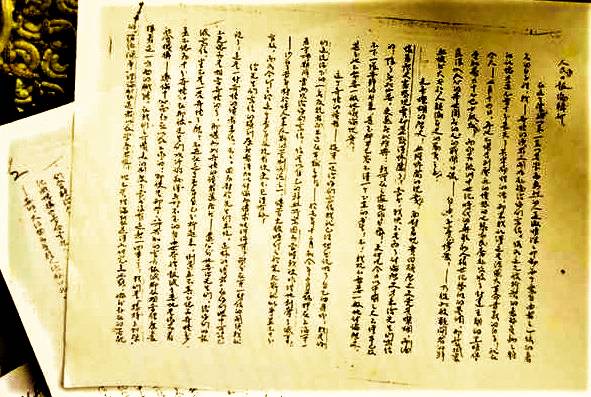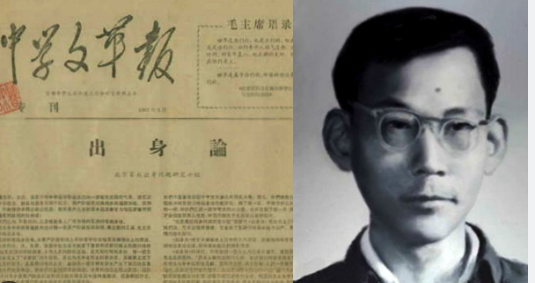Explore the collection
Showing 4 items in the collection
4 items
Article
Lin Zhao: A Letter to the Editorial Board of People's Daily
This is one of the most significant essays written by Lin Zhao, the pen name of the Christian intellectual Peng Lingzhao, who was born on January 23, 1932 in Suzhou.
In 1947, she attended a Methodist girls school and was baptized. Soon after, however, she joined the underground Communist Party and began writing critiques of the Kuomintang-led government under the pen name Lin Zhao. Before the Communist takeover in 1949, Lin Zhao ran away from home to attend a journalism school run by the party. During this time she joined party campaigns to eradicate the landholding gentry that ran local society.
Lin Zhao was admitted to the Chinese Department of Peking University in 1954. It was there that she broke with Communism and gradually rediscovered her Christian faith. She was classified as a rightist in 1957 for speaking up for other students. During this time, she met Zhang Chunyuan, one of the founders of the magazine "Spark," which the China Unofficial Archives also holds. She contributed two epic poems to the magazine. The magazine was shut down in 1960 and people affiliated with it were detained, including Lin.
She was released on medical parole in early 1962 due to tuberculosis, but was arrested and imprisoned again in December of the same year. She was detained in Shanghai No. 1 Detention Center and Tilanqiao Prison. When she was denied a pen and paper, she sometimes used a sharpened straw or chopstick to prick her finger and write in blood.
While in prison, she wrote a large number of texts, including the 140,000-word essay to <i>People’s Daily</i> that we feature here. This essay is the fullest expression of Lin’s political beliefs. She wrote it in 1965, dating it July 14 because it was the date of the storming of the Bastille in the French Revolution. It took Lin five months to finish the letter, which ran to 137 pages. She wrote the essay in ink, but stamped it repeatedly with a seal bearing the character “zhao” that she inked in her own blood.
The letter has not (yet) been translated into English so a few salient points are worth mentioning.
As Lin’s biographer, the Duke University professor Lian Xi wrote in his biography of Lin (<i>Blood Letters: The Untold Story of Lin Zhao, a Martyr in Mao’s China</i>, Basic Books, 2018):
“Lin Zhao challenged the theory of a continuous ‘class struggle,’ which the Communists saw as intrinsic to human history and from which there was no escape. Since the 1920s, the CCP had looked upon this theory as an immutable truth and had used it to justify the so-called dictatorship of the proletariat after 1949….”
Lin Zhao scoffed at this. ‘I do not ever believe that, in such a vast living space that God has prepared for us, there is any need for humanity to engage in a life-and-death struggle!’ The CCP dictatorship was but a modern form of ‘tyranny and slavery,’ she wrote in her letter to the party’s propagandists.
“'As long as there are people who are still enslaved, not only are the enslaved not free, those who enslave others are likewise not free!,' she wrote. Those seeking to end Communist rule in China must likewise not ‘debase the goal of our struggle into a desire to become a different kind of slave owner.' ‘The lofty overall goal of our battle dictates that we cannot simply set our eyes on political power—the goal must not and cannot be a simple transfer of political power!’"
“The end was ‘political democratization… to make sure that there will never be another emperor in China!"
Professor Lian continues: “Lin Zhao wrestled with the moral question of whether violence was a justified means to that end. Her Christian faith had hardened her for the fight. At the same time, it also tempered her opposition. She acknowledged the occasional ‘sparks of humanity’ even in those who were at the ‘most savage center’ of Chinese communism. As strenuously as she argued against her imprisonment, against Mao’s dictatorship, and for a free society, she was unable to sanction violence in that struggle. ‘As a Christian, one devoted to freedom and fighting under the Cross, I believe that killing Communists is not the best way to oppose or eliminate communism.’ She admitted that, had she not ‘embraced a bit of Christ’s spirit,’ she would have had every reason to pledge ‘bloody revenge against the Chinese Communist Party.’”
The same year that the letter was finished, Lin Zhao was sentenced to 20 years for counterrevolutionary crimes. On April 29, 1968, the sentence was changed to death and she was executed on the same day. She was 36 years old.
Article
On Family Background
Yu Luoke (May 1, 1942 - March 5, 1970): Worker, freelance writer, and public intellectual.
Yu was born into an educated family in northeastern China, which for a period of time was under Japanese occupation. His father studied on a state scholarship in Waseda University in Tokyo, while his mother came from a wealthy family in Beijing and studied business at Tokyo Girls High School. When the two returned to China, they went into business, married, and had three children.
When the CCP took power, the family was declared part of the “bourgeois class” and like other “black elements”--classes of people who the party declared to be enemies–was persecuted. The father was arrested in 1952 on charges of tax evasion and released. In 1957, Yu Luoke’s parents were declared Rightists and sent to labor camps. In 1959, Yu graduated from high school with highest honors but as the offspring of an undesirable class was not permitted to attend university. In 1961, he was allowed to work on a farm in a Beijing suburb, where he realized that class identity was also important in rural China–landlords and their children were even beaten to death. In 1964 he returned to the city and apprenticed at a machinery factory. Yu realized that he was part of an untouchable caste in Maoist China and would be condemned forever, no matter what he believed or how hard he worked.
These experiences were the genesis of Yu’s essay, which became one of the most famous texts of the Mao era. Yu wrote it at the start of the Cultural Revolution. The ten-thousand character essay is called chushenglun, or “On Family Background” (sometimes translated as “On Class Origins"). In it, he warned that the “five black categories'' were becoming a permanent underclass, while China’s rulers were from the hongwulei, or “five red categories:” poor and lower-middle peasants, workers, revolutionary soldiers, revolutionary officials, and revolutionary martyrs, including their family members, children, and grandchildren. He warned of a new ruling class based on bloodlines.
The essay was published in a journal that Yu and his brother Yu Luowen called the "Journal of Secondary School Cultural Revolution." In January 1967, about thirty thousand copies were printed, and the young men began distributing them around the capital, selling them for two cents a copy. They sold out in a few hours. In February, they printed another eighty thousand copies.
Soon, hundreds of letters each day arrived at Yu Luoke’s local post office—so many that he had to go collect them in person. The missives detailed how the Communists’ policies had caused them to suffer. People traveled from across China to visit them at their home, excited that someone finally had uncovered how the Chinese Communist Party ruled. The editorial board was expanded to twenty people, and the group sponsored debates and seminars.
The Journal was closed down in April 1967. Yu Luoke began to write on economic inequality. In January 1968, he was arrested. Two years later, on 5 March 1970, Yu was executed by firing squad at Beijing Workers Stadium.
Article
Operation Yellow Bird
After the bloody suppression of the June 4 Democracy Movement, the Chinese Communist Party went on a massive manhunt for the key figures of the movement. Some Hong Kong people organized a secret channel to help pro-democracy activists escape from the Mainland, codenamed "Operation Yellow Bird." The author of this book, Jiang Xun, is a veteran of the media and describes in detail how the "Yellow Bird Operation" took place.
Article
Toolkit for the Removal of Xi Jinping
Before carrying out the protest, Peng Lifai had published a strategic guide for strikes and boycotts on ResearchGate. This 20-chapter document, spanning 21 pages excluding the cover and table of contents, summarized Peng's personal political ideas and served as an explanation of his actions. Read English summary <a href="https://chinachange.org/2022/10/19/bridge-man-peng-zaizhous-mission-impossible-and-his-toolkit-for-the-removal-of-xi-jinping/">here</a>.
The first chapter, "Strategy for Protesting Against National Traitors," explains that the purpose of strikes and boycotts is to oppose Xi Jinping's unconstitutional re-election and to push China toward democracy, freedom, and prosperity. It also outlines the methods of protest, including decentralization in the early stages, organizing communities and universities into networks, and using information and non-violent means to spread the message rapidly. Proposed methods of protest include honking car horns, strikes, boycotts, hanging banners, distributing leaflets, burning tires, and setting up roadblocks.
In the second chapter, "Opposing Xi," Peng Lifai wrote a humorous poem.
The third chapter, "A Letter to Fellow Countrymen," enumerates the regressions in Chinese society under Xi Jinping's rule, drawing connections to China's history of power transitions, uprisings, and political changes. He criticizes the oppressive nature of the "zero-COVID" policy and calls for resistance from various groups, including soldiers, police, party members, the media, unemployed and bankrupt individuals, entrepreneurs, civil servants, university students, and intellectuals. Peng emphasizes the need for soldiers, police, armed police, and government officials to receive the protest message, hoping for leaders like General Cai E from the Republic of China era, who opposed Yuan Shikai’s imperial ambitions, to rise and help remove the dictator. He writes, "Fellow countrymen, we are the masters of the People's Republic of China. If we remain silent, we will all become slaves to the dictator. For the right to vote, for fairness and justice, for freedom and democracy, for ourselves and our future generations, let us embark on a new national defense movement."
The fourth chapter, "Long Live the Ballot Song," calls for national elections for people's representatives and officials. It includes a cartoon designed by Peng, turning a nucleic acid testing booth into a polling station, with the caption: "We’ve been pretending to vote for three years. Just place a ballot box at the testing site."
The fifth chapter, "Who Are We," lists China's marginalized groups, including migrant workers, lower-class citizens, flexible workers, unemployed graduates, education sector employees, low-income populations, small businesses, and left-behind children. It concludes with Peng’s statement: "We need to be our own masters. We don’t need to live in a cage."
Chapters six and seven discuss Peng’s vision for a Chinese Communist Party Free Election Committee and a National People’s Election Committee, along with the constitutional and party statute bases for these political concepts.
Chapter eight provides an explanation of the relationship between government, state, and citizens. Peng compares the relationship between citizens and the state/government to that of property owners and property management companies. He writes, "I do not owe gratitude to the property management company, because I am the owner who pays the property fee. I am its master, and it is my servant."
Subsequent chapters describe Peng’s vision for a new government and its key policy demands, including ending mandatory nucleic acid testing, implementing "Charter 08" (a manifesto supported by Nobel Peace Prize laureate Liu Xiaobo), reducing taxes, and reforming state-owned enterprises. He concludes by quoting imprisoned lawyer Xu Zhiyong’s "Letter to Xi Jinping," once again expressing opposition to Xi’s re-appointment as leader. In the copyright statement, he encourages readers to share the guide widely.



